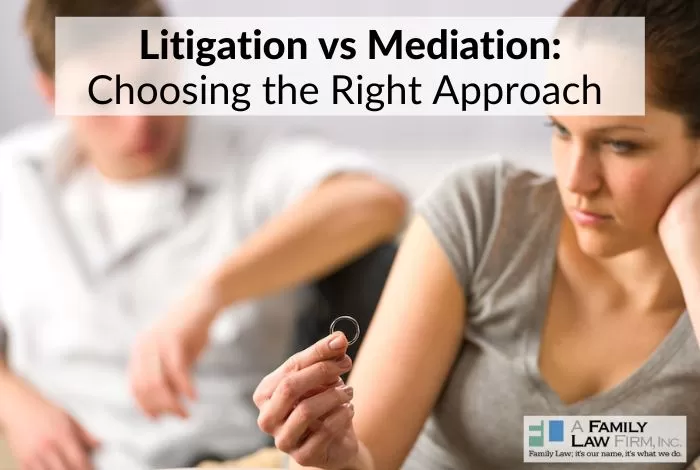When facing divorce, one of the critical decisions you’ll need to make is whether to pursue mediation or litigation. Both approaches have distinct advantages and challenges, and the choice can significantly impact the outcome of your divorce. This guide compares mediation and litigation to help you determine which method is best suited to your circumstances.
Mediation: A Collaborative Approach
What is Mediation?
Mediation is a non-adversarial process where a neutral third party, the mediator, helps the divorcing couple negotiate and reach a mutually acceptable agreement. The mediator facilitates communication and assists in resolving disputes but does not make binding decisions. Mediation focuses on collaboration and finding common ground.

Benefits of Mediation
Cost-Effective
Mediation is often less expensive than litigation. Since it avoids lengthy court battles and multiple court appearances, mediation can save on legal fees and court costs. The streamlined process can also reduce the financial burden of divorce.
Faster Resolution
Mediation typically resolves divorce disputes more quickly than litigation. The process is less formal and can be scheduled at the parties’ convenience, allowing for faster negotiations and agreements. This can lead to a quicker divorce finalization.
Privacy and Confidentiality
Mediation is a private process, and discussions held during mediation are generally confidential. Unlike court proceedings, which are public records, mediation sessions are not open to the public, providing privacy for both parties.
Flexibility and Control
Mediation allows the parties to have greater control over the outcome. The couple can negotiate terms that specifically address their needs and preferences, leading to more personalized and creative solutions. The flexibility of mediation can result in agreements that are mutually satisfactory.
Drawbacks of Mediation
Limited Authority
Mediators cannot make binding decisions or enforce agreements. If the parties cannot reach a consensus, they may still need to resort to litigation. Additionally, mediation is less effective if there is a significant power imbalance between the parties.
Requires Cooperation
Mediation relies on both parties being willing to cooperate and engage in good faith negotiations. If one party is uncooperative or unwilling to compromise, mediation may not be successful in resolving disputes.
Litigation: A Formal Legal Process
What is Litigation?
Litigation involves resolving divorce disputes through the court system. Each party presents their case to a judge, who makes binding decisions on issues such as asset division, spousal support, and custody. Litigation is a formal process governed by legal procedures and court rules.
Benefits of Litigation
Judicial Authority
In litigation, a judge has the authority to make binding decisions and issue court orders. This can be beneficial if the parties cannot reach an agreement or if there are complex legal issues that require judicial intervention.
Structured Process
Litigation provides a structured process with established rules and procedures. This can be advantageous for resolving disputes that involve significant legal complexities or require formal evidence and legal arguments.
Enforcement
Court orders issued during litigation are legally enforceable. If one party fails to comply with a court order, the other party can seek enforcement through the court, ensuring that agreements are upheld.
Drawbacks of Litigation
Costly
Litigation can be expensive due to attorney fees, court costs, and other related expenses. The formal process often involves multiple court appearances and extensive legal work, leading to higher costs.
Lengthy Process
Litigation can be time-consuming, with cases often taking months or even years to resolve. The formalities and potential for delays can prolong the divorce process and create additional stress for the parties involved.
Public Record
Court proceedings are typically public, and the details of the case become part of the public record. This lack of privacy can be a concern for individuals who prefer to keep the details of their divorce confidential.
Choosing the Best Approach
Consider Your Goals and Priorities
Evaluate your goals and priorities when deciding between mediation and litigation. If you seek a quicker, more collaborative resolution and are willing to negotiate, mediation may be a suitable choice. If you require formal judicial intervention and enforceable decisions, litigation may be necessary.
Assess the Complexity of Your Case
Consider the complexity of your case. Mediation is often effective for straightforward cases where both parties are willing to negotiate. For complex cases involving significant assets, intricate legal issues, or high conflict, litigation may be more appropriate.
Evaluate the Relationship with Your Spouse
Assess your relationship with your spouse. Mediation is more effective when both parties are willing to communicate and cooperate. If there is significant animosity or if one party is uncooperative, litigation may be the better option.
Seek Professional Advice
Consult with a family law attorney to explore your options and receive personalized advice based on your specific situation. An attorney can help you understand the implications of each approach and guide you in making the best decision for your divorce.
Conclusion
Choosing between mediation and litigation for your divorce depends on your goals, the complexity of your case, and your relationship with your spouse. Mediation offers a collaborative, cost-effective approach with greater privacy and flexibility, while litigation provides formal judicial authority and enforceability. By carefully evaluating your needs and seeking professional advice, you can select the approach that best aligns with your circumstances and achieve a resolution that supports your legal and personal objectives.










